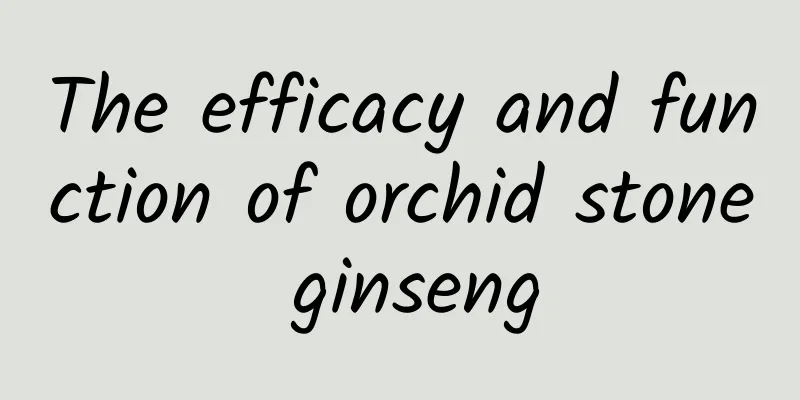The efficacy and function of orchid stone ginseng

|
Traditional Chinese medicine is a Chinese tradition. For many Chinese people, seeing a Chinese doctor and taking Chinese medicine when they are sick is their tradition and habit. Therefore, Chinese medicine is liked by many people. Orchid stone ginseng is a common Chinese medicinal material. Let’s learn about it together below. [Other names] Rock orchid, chicken ginseng, wild ginseng, purple ginseng, small stone ginseng, wild platycodon, mountain goose intestine, wild ginseng [Source] Medicinal material source: The root of Campanula serrata, a plant of the Campanulaceae family. [Original form] Southwestern bellflower is a perennial herb, up to 60cm tall. The roots are carrot-shaped, sometimes only slightly thicker than the stem. Stem solitary, few branched, ascending or erect, covered with spreading stiff hairs. The leaves at the bottom of the stem have winged petioles, while those at the top are sessile; the leaf blades are elliptic, whip-shaped elliptic or oblong, 1-4cm long, 0.5-1.5cm wide, acute or obtuse at the apex, sparsely serrated or nearly entire at the margin, covered with appressed setae on the upper side, and only the veins have setae or are densely covered with stiff hairs on the lower side. The flowers are drooping, terminal on the main stem and branches, sometimes forming a cyme; the calyx tube is conical, covered with coarse bristles, the lobes are triangular to triangular-subulate, 3-7mm long, 1-5mm wide, entire or with fine teeth, with bristles only on the veins on the back or all over; the corolla is purple or bluish purple or blue, and bell-shaped, 8-15cm long, split to 1/3-1/2; the style is less than 2/3 of the length of the corolla and is hidden in the corolla tube. Capsule inverted cone-shaped. Seeds oblong, slightly flat. Flowering period is from May to September. [Habitat distribution] Ecological environment: Growing on hillside grasslands and sparse woods at an altitude of 1000-4000m. 【Nature and flavor】 Sweet; warm 【Entry into Meridians】 Enters the lung and liver meridians 【Functions and indications】 Dispel wind and dampness; replenish deficiency and stop bleeding. It is used for rheumatic pain, paralysis, tetanus, hemoptysis due to consumptive tuberculosis, and physical weakness after illness. [Usage and Dosage] For oral use: decoction, 15-30g; or stew meat. 【Note】 "Yunnan Chinese Herbal Medicine": "Avoid sour, cold and beans." 【Excerpt】 Chinese Materia Medica This article introduces to us what Orchid Stone Ginseng is. We know that Orchid Stone Ginseng has a very high medicinal effect, but we must remind everyone that Orchid Stone Ginseng generally cannot be eaten indiscriminately, otherwise it will cause serious consequences. I hope everyone will treat it with caution. |
<<: The efficacy and function of wolf oil
>>: The efficacy and function of blue stone ginseng
Recommend
What are blood diseases?
Blood health is very important to people. Once so...
How to talk nonsense seriously, just multiple columns of data
The morning news said that the consumer price ind...
Trapped in a body for 23 years, he was always considered a vegetable, but he was actually conscious...
It’s hard to imagine what this experience is like...
What does Jiaogulan taste like when you drink it in water?
If we do not have a regular diet in our lives, ou...
The efficacy and function of stone vegetable
There are many types of Chinese medicine. When we...
Drink Houttuynia cordata in water
We live in the 21st century and are busy with our...
What is the fruiting body of Cordyceps militaris
Many of us may not have even heard of the term Co...
Notes on the dosage of American ginseng soaked in water
Regularly drinking American ginseng in water can ...
World Turtle Day丨Did you know? Sea turtles, which have existed for more than 200 million years, are on the verge of extinction...
Sea turtles, an ancient and magical large marine ...
How can the New Year's Flag "stand firm"? Popular science is here →
Lose weight like a flash of lightning, be sure to...
The efficacy and function of cauliflower root
There are many kinds of common Chinese medicinal ...
The efficacy and function of Ox Gallbladder Ginseng
We know that there are many kinds of Chinese medi...
This high-speed railway is about to open! The driver's perspective is exposed in advance
Ganzhou-Shenzhen High-Speed Railway (Ganzhou-Sh...
The sweetness that you can't let go of, is it all the taste of sugar?
Author: Ju Peng, Zhang Ling (Kunming Institute of...









